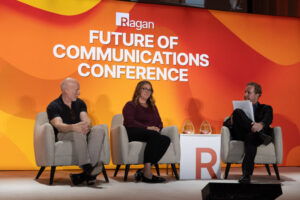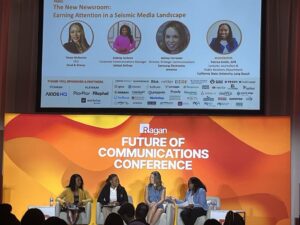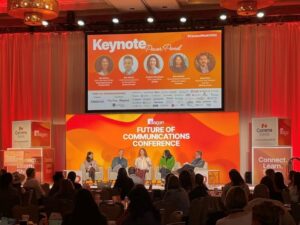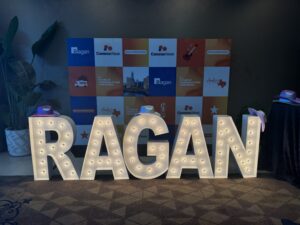How and where Latine communicators connect in Austin
Understanding the state of latinidad in Central Texas during Ragan’s Communications Week in Austin.
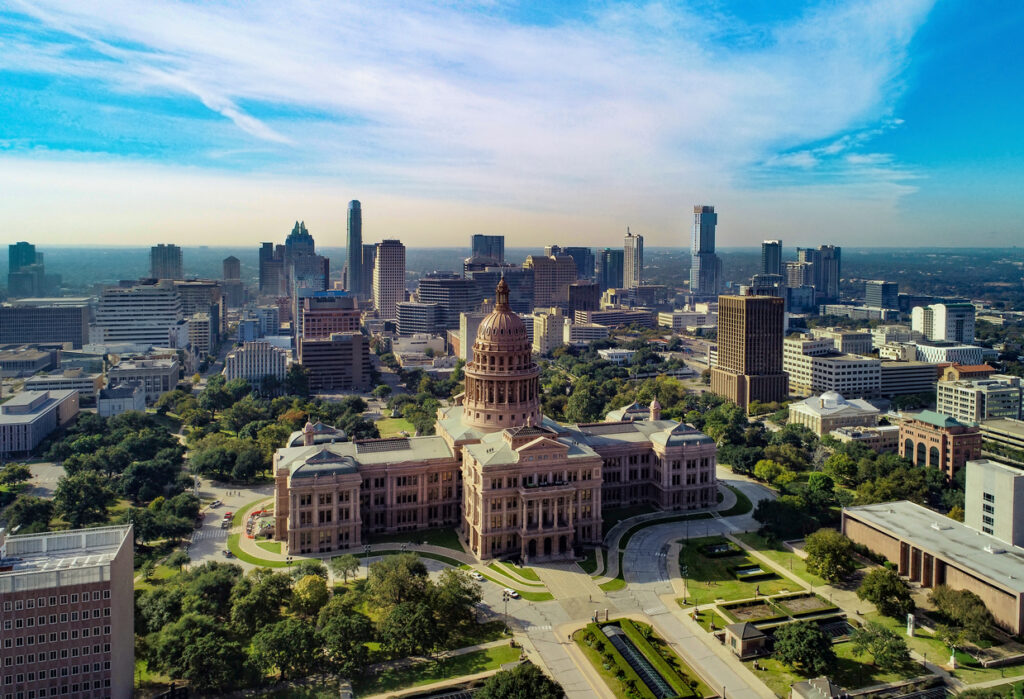
Fabiana Meléndez Ruiz is a Venezuelan-American communications expert and strategic storyteller. She is the founder & CEO of Refuerzo Collaborative, a Latina-owned communications agency creating holistic, multicultural, and dynamic strategies so clients can find their truth, increase their impact, and sustain brand growth.
Texas boasts a population of 30 million people, making up 8% of the total population of the United States. As of 2023, the Latine population now makes up the biggest share of that number with 40.2% of Texas residents identifying as Latine. The power of the Latine community in the state is measurable – the Texas Latino economy is the second largest economy in the United States which “grew by $147 billion between 2017 and 2022.” according to a report by Houston Landing.
Despite this impact, the Latine community is severely underrepresented in marketing, and even less so in the communications industry. Approximately only 11.9% of those in public relations are Latine, and only about 7.6% are in leadership positions.
It’s now more important than ever to understand the state of Latine communicators in spaces where this historically minoritized community is the majority. How are these professionals connecting with one another? And, most importantly, where?
The impact of representation
Because storytelling is an integral part of Latine culture, it’s no surprise that so many would gravitate to a career in an industry focused on the science and art of telling stories.
And for many of us, it goes beyond that – it’s all about our representation in industries that are seen as inaccessible and glamorous.
This was the case for Angel Leverett, the Director of Marketing & Communications for Austin Habitat for Humanity. An El Paso native, she was fascinated by the local anchors on the news who would showcase the highs and lows of El Paso.
“She was so poised, graceful, and was focused on the community – a Latina on TV doing big things,” says Leverett, “when I started a career in PR, I saw that the opportunity to serve as a voice for my community, bridge cultural gaps, and make sure that stories that are being told about people like me are being told authentically and with compassion.”
Angela Navarro, is the events and public relations manager for the Downtown Austin Alliance, a nonprofit organization that aims to create, preserve and enhance the value and vitality of downtown Austin. In addition to her work with the Downtown Austin Alliance, she is also the current president of PRSA’s Austin chapter.
Navarro believes that, but feels there is still a lot of work to be done.
“Representation is essential, particularly in seeing Latinx professionals as business owners, PR specialists, and media figures across the city as we help elevate and bring stories that would otherwise not matter to others to the forefront,” she said
But even with the obstacles, the impact is apparent. As the president of PRSA, Navarro has a direct hand in leading a diverse group of voices in shaping the communications field. “Being a Latinx communicator is about advocating for cultural inclusion, providing guidance to future generations, and ensuring that our stories are authentically told in every space we occupy,” she explained.
Engaging with the wider Austin comms community
Austin has cultivated several communities dedicated to the growth and honest conversations of communications professionals. Women Communicators of Austin (WCA), an organization established in 1921, has championed women in journalism, media, marketing, and every other communication role for over 90 years.
Notable members have included Liz Carpenter, who wrote the 58 words LBJ used to comfort the nation after the assassination of President Kennedy.
Leverett, who is the president-elect for WCA, states that organizations like these are where a lot of the conversations for Latine communicators are happening. “There have been moments where some of these organizations have set up intimate spaces for [us] to get honest about the work,” she said. “About the highs, the low, and the opportunities available to us in the Austin community.” .
Navarro echoes these sentiments. Originally a New Jersey native, she lived in Florida prior to making Austin her home six years ago. Despite being drawn in by its “weirdness,” she found it difficult to find a sense of cultural belonging.
“Finding your space in a new city can be hard, but I’ve carved out a place for myself here in Austin,” she said, explaining that the city has tons of professional organizations that cater to young and diverse professionals. Navarro found community in organizations like the Young Hispanic Professional Association of Austin (YHPAA), the Young Urban League, and the Austin Young Professionals.
Where conversations are happening
Austin is an incredibly diverse town, and the impact Latines have had on the city is evident in the physical spaces communicators are going to have some of these conversations.
Leverett says many conversations are happening at Joe’s Bakery, which feels like home. She remarks that “the smells, the people I start conversations with, what I love about being Latinx is that we gravitate towards each other and can just talk to each other.” Anytime she goes to Joe’s, she feels her “latinaness” cup filled so she can be herself.
She also frequents Gabrielas, a restaurant owned by Latina restaurateur Gabriela Bucio. As soon as she walks in, Leverett sees women who look like her celebrating and being unapologetic. a space where “we don’t have to hide our wins,” she said.”
For Navarro, the conversations are happening closer to home. The Downtown Austin Alliance is leasing a space as part of its Downtown Austin Space Activation program. The program rents underutilized buildings and turns them into platforms for social impact. This program is significant for Latine communicators because it empowers them to have a forum in Downtown Austin, an area that can sometimes feel less inclusive.
“This initiative helps ensure that public spaces reflect the diversity and values of the city’s Latino population, reinforcing the importance of inclusivity in urban development and fostering a more connected and equitable environment for all.” said Navarro.
Ensuring equity and purpose through mentorship and affinity groups
Both Leverett and Navarro believe in the power of mentorship. Latine professionals don’t always have access to the same opportunities, so ensuring that they have mentors who can guide them and open those doors is a major way to ensure equity.
In addition, both Navarro and Leverett are focused on creating programming that will ensure the space for Latine communicators to thrive. Leverett created Communicators of Color as an affinity group for WCA. Its goals are to create a space where communicators of color can foster community and have honest conversations about working in the industry.
Navarro has grown the PRSA board from five people to 13, and is a supporter of events that promote authentic conversations for diverse communities in Austin such as the annual Drinks & Drag event and the “Being Series”, which organizes panels of Latinx, Black and LGBT communicators to engage with others in the industry.
“One of the most valuable pieces of advice I received from my first boss was, “Angela, when you walk into a room and no one else looks like you, that’s exactly why it’s important to speak up and share your perspective.”” said Navarro.
“Being in spaces where you feel like the ‘other’ can be challenging, but it’s crucial to find your voice. Your thoughts may differ from those around you, and sharing them can not only validate your own experiences, but also create an opportunity for others to engage in meaningful discussions. This exchange can lead to greater understanding and inclusivity.”
Join us in Austin for Ragan’s Future of Communications Conference, the flagship event of Comms Week, this week!

